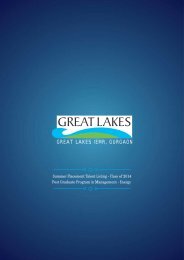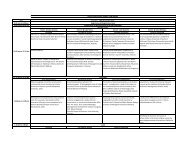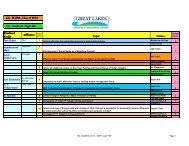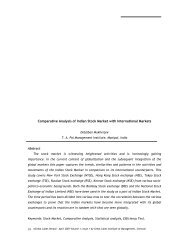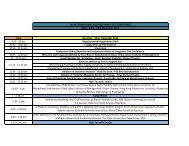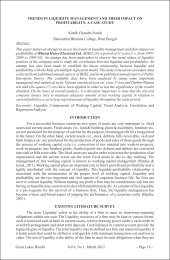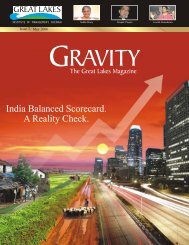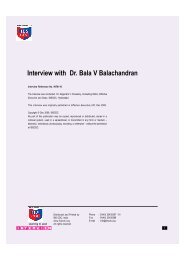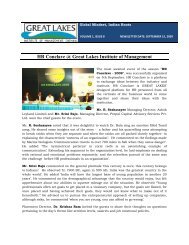Open and find the right kind of future leaders for your ... - Great Lakes
Open and find the right kind of future leaders for your ... - Great Lakes
Open and find the right kind of future leaders for your ... - Great Lakes
Create successful ePaper yourself
Turn your PDF publications into a flip-book with our unique Google optimized e-Paper software.
Course Curriculum<br />
PGPM PROGRAM OVERVIEW<br />
<strong>Great</strong> <strong>Lakes</strong> Institute <strong>of</strong> Management aims at developing ‘Business Ready<br />
Managers’. We have a unique specialisation model which is structured into<br />
‘Horizontals’ <strong>and</strong> ‘Verticals’. The ‘Horizontals’ focus on functional<br />
specialisation, while ‘Verticals’ focus on industry-specific specialisations. This<br />
enables students to creatively leverage <strong>the</strong>ir knowledge <strong>and</strong> skill sets in <strong>the</strong> area<br />
<strong>of</strong> <strong>the</strong>ir interest. The course curriculum has been framed by some <strong>of</strong> <strong>the</strong> best<br />
names in academia, who <strong>for</strong>m <strong>the</strong> Academic Advisory Council <strong>of</strong> <strong>Great</strong> <strong>Lakes</strong>.<br />
Course Content<br />
The course is divided into seven terms, with each term <strong>of</strong> about six weeks. This<br />
seven-term program encompasses a set <strong>of</strong> core courses in Strategy, Marketing,<br />
Finance & Accounting, Entrepreneurial Economics, Organisational Behaviour,<br />
Operations <strong>and</strong> Quantitative Decisions. The program is designed to meet <strong>the</strong><br />
emerging trend <strong>for</strong> acquiring management skills among <strong>the</strong> students, irrespective<br />
<strong>of</strong> <strong>the</strong> Under Graduate specialisation <strong>and</strong> <strong>the</strong>re<strong>for</strong>e <strong>the</strong> program is structured to<br />
cater to a wide variety <strong>of</strong> undergraduate degrees. The last four terms <strong>of</strong> <strong>the</strong> course<br />
are called <strong>the</strong> “Specialisation Phase” where <strong>the</strong> students have to choose <strong>the</strong>ir<br />
field <strong>of</strong> specialisation.<br />
The Gurukulam way <strong>of</strong> learning<br />
One <strong>of</strong> <strong>the</strong> hallmarks <strong>of</strong> <strong>the</strong> program is to teach students, <strong>the</strong> cultural values <strong>and</strong><br />
ethics <strong>of</strong> our mo<strong>the</strong>rl<strong>and</strong> which helps to inculcate in students <strong>the</strong> <strong>right</strong> value<br />
system <strong>and</strong> a global mindset to become successful <strong>leaders</strong> <strong>of</strong> tomorrow. They are<br />
taught ‘Indian Philosophy’ comprising <strong>the</strong> teachings <strong>of</strong> Swami Vivekan<strong>and</strong>a.<br />
The course requires students to carry out a “Karma Yoga” project <strong>for</strong> a period <strong>of</strong><br />
five months, <strong>for</strong> <strong>the</strong> upliftment <strong>of</strong> relatively powerless people <strong>of</strong> <strong>the</strong> society.<br />
Students visit villages, carry out surveys about <strong>the</strong>ir problems <strong>and</strong> work out<br />
possible solutions.<br />
Empirical Study<br />
Every student has to carry out an empirical study in <strong>the</strong> <strong>for</strong>m <strong>of</strong> a real life study<br />
on a chosen topic, under <strong>the</strong> guidance <strong>of</strong> prominent faculty members. In <strong>the</strong><br />
course <strong>of</strong> empirical research, <strong>the</strong> student attempts to study accurately <strong>the</strong><br />
interaction between dependent <strong>and</strong> independent variables, by defining a<br />
hypo<strong>the</strong>sis, ga<strong>the</strong>ring in<strong>for</strong>mation, analyzing data <strong>and</strong> <strong>the</strong>n accepting or<br />
rejecting <strong>the</strong> hypo<strong>the</strong>sis based on <strong>the</strong> analysis <strong>and</strong> finally documenting <strong>the</strong><br />
<strong>find</strong>ings. The accumulation <strong>of</strong> evidence <strong>for</strong> or against any particular <strong>the</strong>ory<br />
enable planned research designs <strong>for</strong> <strong>the</strong> collection <strong>of</strong> empirical data, <strong>and</strong><br />
academic rigor plays a large part in judging <strong>the</strong> merits <strong>of</strong> research design &<br />
<strong>find</strong>ings.<br />
Indian Philosophy<br />
This course teaches Indian Culture <strong>and</strong> Ethos. Upanishads, Bhagavad Gita,<br />
Karma Yoga <strong>and</strong> <strong>the</strong> teachings <strong>of</strong> Swami Vivekan<strong>and</strong>a are a few subjects which<br />
are designed to enhance <strong>the</strong> interpersonal skills <strong>of</strong> students. As part <strong>of</strong> Karma<br />
Yoga, students need to work selflessly in social service activities at <strong>the</strong> grassroot<br />
level , such as village development <strong>and</strong> need to bring a change in <strong>the</strong> lives <strong>of</strong><br />
villagers. This is compulsory <strong>for</strong> every student <strong>and</strong> <strong>the</strong> institute strongly<br />
believes in inculcating social responsibility <strong>and</strong> moulding <strong>the</strong> students minds in<br />
that direction in addition to <strong>the</strong>ir pursuit <strong>of</strong> <strong>for</strong>mal academics.<br />
22 23




